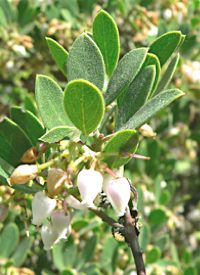
"In October 2009, an ecologist identified a plant growing in a concrete-bound median strip along Doyle Drive in the Presidio as Arctostaphylos franciscana," (pictured at left) the U.S. Department of Interior wrote in an Aug. 10, 2010 Federal Register journal entry. "The plant’s location was directly in the footprint of a roadway improvement project designed to upgrade the seismic and structural integrity of the south access to the Golden Gate Bridge."
"The translocation of the Arctostaphylos franciscana plant to an active native plant management area of the Presidio was accomplished, apparently successfully and according to plan, on January 23, 2010," the agency added. CNSNews.com explained the purported "significance" of this particular plant:
The bush — a Franciscan manzanita — as a specimen of a commercially cultivated species of shrub that can be purchased from nurseries for as little as $15.98 per plant. The particular plant in question, however, was discovered in the midst of the City of San Francisco, in the median strip of a highway, and was deemed to be the last example of the species in the "wild."
Prior to the discovery of this "wild" Franciscan manzanita, the plant had been considered extinct for as long as 62 years — extinct, that is, outside of people’s yards and botanical gardens.
Previously, the shrub was located in two cemeteries in the city’s Richmond District. The Interior Department also said there had been "unconfirmed sightings" of the plant in the Haight-Ashbury District, and that the district’s population of these particular shrubs has been "lost to urbanization."
On October 16, 2009, a botanist by the name of Daniel Gluesenkamp identified the bush along Doyle Drive, the highway that leads to the Golden Gate Bridge that is currently under renovation. Further examination from an ecologist and the Presidio Trust — which helps to preserve the Presidio public park site — concluded that the shrub was a Franciscan Manzanita.
Consequently, on December 21, 2009, the Presidio Trust, the National Park Service, the California Department of Transportation (Caltrans), the U.S. Fish and Wildlife Service, and the California Department of Fish and Game collectively drafted an agreement — "Memorandum of Agreement Regarding Planning, Development, and Implementation of the Conservation Plan for Franciscan Manzanita" (MOA) — which detailed how, why, and when the shrub would be relocated.
The MOA called for a nearly $80,000 transfer to the Presidio Trust "to fund the establishment, nurturing, and monitoring of the Mother Plant in its new location for a period not to exceed ten (10) years following relocation and two (2) years for salvaged rooted layers and cuttings according to the activities outlined in the Conservation Plan."
The agreement also called for $100,000 to finance the "hard removal" of the plant and $25,605 to fund the "reporting requirements" for the decade following the removal. Combined with the $79,470 transfer to the Presidio Trust, the overall cost for "translocating" the Franciscan Manzanita bush calculated to a whopping $205,075. Other costs the project included, according to the memorandum:
- "Contract for and provide funding not to exceed $7,025.00 for initial genetic or chromosomal testing of the Mother Plant by a qualified expert to be selected at Caltrans’ sole discretion."
- "Contract for and fund the input, guidance, and advice of a qualified Manzanita expert on an as-needed basis to support the tending of the Mother Plant for a period not to exceed five (5) years, provided that said expert selection, retention and replacement at any point after hiring rests in the sole discretion of Caltrans."
- "Provide funding not to exceed $5,000.00 to each of 3 botanical gardens (Strybing, UC, and Tilden) to nurture salvaged rooted layers and to monitor and report findings as outlined in the Conservation Plan."
- "Provide funding not to exceed $1,500.00 for the long-term seed storage of 300 seeds collected around the Mother Plant in November 2009 as outlined in the Conservation Plan."
The plant is now being guarded at an undisclosed location, partly because a fear that the "wild plant" might be trampled by nature-lovers and other onlookers. "[A] single trampling event could result in damage or the death of the wild plant," the Interior Department wrote in a Sept. 8, 2011 Federal Register entry. "As noted… the Presidio Trust and NPS have made continuous efforts not to reveal the location of Arctostaphylos franciscana. They are concerned that public knowledge of the A. franciscana location would attract large numbers of plant enthusiasts who may damage the A. franciscana and compact the soil."
According to the 2011 Federal Register entry, because the plant has been relocated to an undeveloped area in the Presidio and is not benefiting from the level of protection and nutrients that other plants enjoy, it must be considered "wild."
But still, however "wild" Franciscan Manzanitas may be, one California nursery currently sells them online for only $15.98 per bush.



